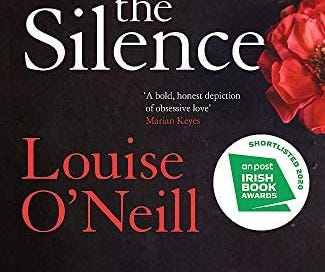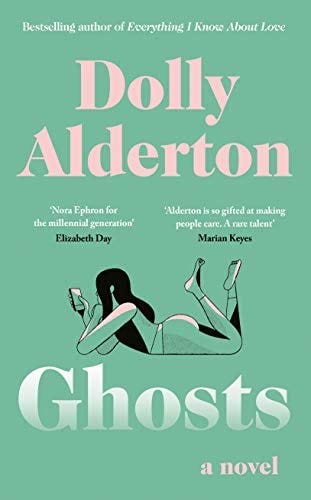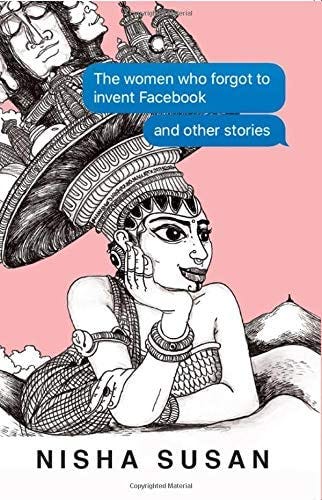Dear Reader,
Yesterday I was glued to my laptop replying to pending emails, spring-cleaning the inbox and ticking off tasks. A rewarding day by evening. But my eyes felt dead. My neck hurts so bad and I think I might have to stay away from the laptop for a day. Don’t we all just hate the glaring screens after being glued to them for so long? I wonder what the future holds. Screen-less work? Typing in air? I have been fighting an urge to read Wuthering Heights—is it the weather?—but l I’ve read it so many times already. There’s a copy of Dracula calling to take me out on a classics spin, but I just can’t decide. Choosing a new book has to be the most difficult decision ever. Coming back to the newsletter, lots to read today—three 4-star books and the amazing links are more than ‘amazing’ this time.
What I Read
I love a good psychological thriller and After the Silence by Louise O’ Neill was a saviour among many meh books recently. It involves rich people and a murder. While you can predict where the novel is heading to, you are never sure. This is because the characters are blobs of unreliability. The heroine, Keelin, drinks, sometimes sleeps after drinking (is she drugged?), is a victim of abuse from her first husband. Her son is reserved, keeps to himself but we worry, as does his mother, whether he has genetically inherited violent traits from his biological father. Henry, the smiling villain—too good, too caring, too charming, lots of gaslighting, and overly possessive about phones and search histories. He can quote and win over feminists and is very worried about his public persona. O’Neill throws you into a sea of unreliability and I imagine she laughs as she sees the reader trying to make sense of the mystery.
Ten years ago, on the night of a wild party at Henry and Keelin Kinsella’s luxury house on the Irish island of Inisrun, there is a terrible storm which cuts the island off from the mainland. Nessa, one of the Crowley sisters, is murdered and everyone suspects it is someone from the island. The novel begins with two Australian documentary makers wishing to film the suspects and islanders about the ten year old crime. Old secrets, wounds surface. Oh my! This was a wild one!
After the Silence was thrilling, messing-up-with-head read and while you know what’s going to happen before the actual end, you feel exhausted, helpless and very suspicious. Trust no one, not even the narrator. Every time I felt some sympathy for a character, they behave suspiciously, so I am wondering ‘Is this friendship a ploy’ , ‘What are they hiding’, and screaming in my head ‘Lies, lies lies.’
Another book I enjoyed this week was Dolly Alderton’s debut novel Ghosts (published in UK only). It is funny and very relatable. At thirty two years, food writer and author Nina Dean, wonders how many languages she could’ve mastered in the time she spent removing her upper lip hair if she lived to be eighty five years old. She is single; she is looking for inspiration at work. Her mother Nancy is rebranding herself as Mandy and she cannot understand why. Her father has dementia. Her ex-boyfriend is getting married, her friends are marrying, getting babies and flirting with men they meet on online dating platforms.
It is refreshing when our digital addictions find their way to the page. Here Whatsapp conversations (and stalking), kitsch vintage slogan gifts (because of 'her prolonged state of singledom') and socializing at ex’s wedding parties turn hilarious. This is really a book for the millennials. Who would understand why Nina falls head over heels for Max who declares he’s going to marry her on their first date through a dating app? Don’t we know how difficult it is to create alibis—like Nina’s best friend Lola does—by posting Instagram pictures when faking a cold? Why is a date online on Whatsapp all the time?—the women gossip. Nina goes through heartbreaks, ghosting, unexpected sex, dating algorithms (“The most ticked people were offered up as bait for the new user’s month, then they leave you with the rest of the riff-raff…It works because you wade through the bottom dwellers indefinitely, always holding out hope that you’d find the chest of buried treasure again”) and incompatible neighbours. There are so many funny moments and sarcasm scattered in this book and they are all relatable, contemporary worries.
I laughed so much, but then I wondered if I am laughing at myself and other fellow millennials. If you are looking for something that’ll keep you entertained after a busy work day, Ghosts is the one. It is millennial crisis at its best.
If you are short of time, here’s a tasty short story collection, The Women who forgot to invent Facebook and other stories by Nisha Susan. It is full of surprises and Susan's writing is original, snarky and witty. There are kerchief kumaris, hot-hot Vilas and Blouse Mohan. The title story The Women Who Forgot to Invent Facebook is about casual hook ups and a map of sexual partners. Two personal favourites in the collection are Teresa—a second wife discovers her husband’s first wife’s secret blogs and try to understand her and The Trinity—three fun loving women who dance, flirt with IIT boys and make eyes roll with fashionable (and sleeveless) blouses from Cochin’s best tailor Blouse Mohan (best because of his designs; but also the secret to his perfect measurements is that he ‘looks’ at your chest without measuring with a tape but at the end of the story they might not be as bold as they seem at first). I should add here that I did raise my eyebrows slightly ‘really?’ on first read because the geeky IIT girls mentioned in the story is a popular stereotype and I disagree. But on further thinking, if I read it as an opinion of the three high-headed women from Cochin in the story, it kind of makes sense. In No Filter, you are creeped out about obsession. Another story I loved—How Andrew Wylie Broke my Heart—begins with the heroine Dakshayini thinking that her friend Anita—a rum-and-coke drinking maniac who swears like a Telugu cowboy—who was a competition 'was really out of the market' after her 'strange, bloody, marriage' and babies. Later Dakshayani is involved in a sex chat with a literary agent and things go wrong. The unreliability and open ending was just perfect.
Some stories, as is common in collections, fail to make an impact. But overall, the stories are fun, witty, badass and very entertaining. Susan’s women have loud laughs, sleep around, drink, swear, talk about sex, gossip, have affairs, get trolled (The Gentle Reader where a writer is trolled), monitor disturning social media content (All Girls together). Also I love how different cities—Ernakulam, Chennai, Bangalore, Thiruvananthapuram—and smaller nuances blend in these stories. The biggest strength in Susan’s stories is giving space to the women are unapologetically themselves instead of sad Indian stereotypes. They are here to tell their story. And they do. Very well indeed.
Cook
This braised paneer from Raks kitchen. I dislike daily cooking and this is an easy-peasy hardly-any-time-to-put-together dish that tastes good and looks pretty. I topped mine with microgreens and not spring onions. Also tweaked the recipe a bit to my taste, so go ahead and experiment a bit.
Amazing links
- This utterly fascinating, at times eerie and magical, read about Susanna Clarke and her books (Laura Miller, The Newyorker)
"...Several people have pointed this out to me—that, having written a long book in which there was a nineteenth-century illness, I then had a nineteenth-century illness. Or that I wrote a long book in which there was this sort of enchantment, and then fell into this strange enchantment myself. It’s absolutely right.” She joked, “You really shouldn’t annoy fairies, or write about them—they don’t like it very much.”
- Profile : Miranda July's missed connections, Instagram lovers, quarantine and poop is weird, and full of surprises (E. Alex Jung, Vulture)
“If my mom calls me, she begins with ‘This is your mother, Lindy,’ as if I may have forgotten who that is… July’s work is always about taking the risk of going somewhere unfamiliar and then finding her way back. Sometimes people do not want to go there.”
- Long read ‘Monsters made, not begotten’ by Tiffany Tsao on family wealth, burdens and life, is worth setting aside time for (Aaww)
“By our conspicuously wealthy lifestyle, my family was guilty of reinforcing a stereotype for which others had to bear the consequences. The ethnic Chinese in Indonesia didn’t deserve to be hated. But what about my family? What about me? Hadn’t monstrous wealth turned us into the monsters that Chinese-Indonesians were accused of being? This uncomfortable fact continued to sit in my stomach long after I finished my dissertation, despite my occasional attempts to digest it.”
- If you loved or hated Indian Matchmaking on Netflix, read this fascinating world of Parsi matchmakers in a shrinking community (Huzan Tata, Firstpost)
"Most maintain Excel sheets or handwritten diaries of profiles and a collection of bio-datas – details of each potential bride or groom that includes personal, family and career descriptions, hobbies, and preferences for a partner – that they share with men and women who register with them."
-I’ve been slowly making my way through The Lying Life of Adults and this essay by Barbara Halla has got me determined to try to devote more time to the book (Reading in Translation)
“Things are always breaking in the lives of Ferrante’s characters: pots spontaneously combust, shards of glass find their way into innocuous-looking bowls of pasta, and families—well, Ferrante’s nuclear families are among the most fragile man-made objects of them all. Fathers leave their wives for younger lovers, mothers abandon their children (if only temporarily), and throughout Ferrante’s oeuvre single motherhood is often the norm. The Lying Life of Adults is no exception to this pattern. In the very first lines of this novel the narrator, Giovanna, tells us that a breakup is forthcoming: “[t]wo years before leaving home my father said to my mother I was very ugly.
- An interview with artist Treasa Maria Rajan features her art from her Studio Ghibli x Onam series — Ponyo in pattupavada, Howl and Sophie, clad in traditional Kerala attires and playing in the swing, Kaonashi having Onam Sadhya and more on her Instagram (Fathima Ashraf, Indulge Express)
Photography : Photographer François Prost captures a slice of Paris in Chinese surburbia (i-D)
"This is what life is like for those in Tianducheng, a housing estate on the outskirts of Hangzhou, Zhejiang Province. It was constructed in 2017, is home to some 30,000 people, and looks like Paris — if Paris was rebuilt inside a Disneyland-style theme park."
Long letter comes to an end. See you after two weeks.
Until next time,
Resh x
(This newsletter may contain affiliate links which might earn me a very small commission at no extra cost to you)
This newsletter is a labour of love. If you liked this newsletter, the best way to show support would be to forward the subscribe link to a friend or share via your favourite social media. Also write to me x







